News Release
User Interviews - Café Bach, Tokyo, Japan
July 15, 2020
July 15, 2020
Taguchi, the Legend of Coffee Brewing
Passing down the art of coffee to the next generation
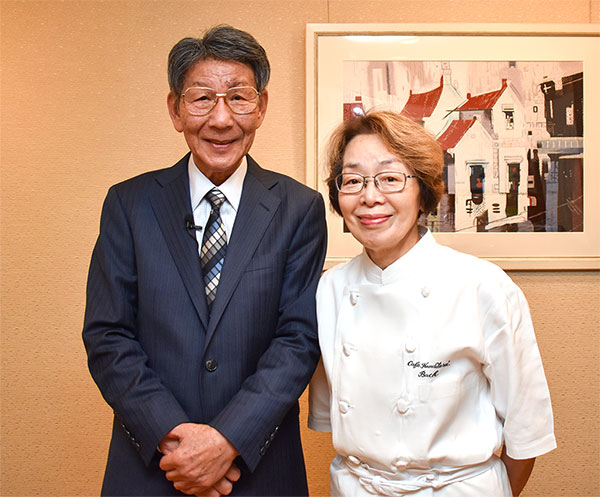 |
|
Mamoru and Fumiko Taguchi |
Mamoru Taguchi, also known as "the legend of roaster" in the industry, brews a cup of coffee using coffee beans carefully roasted to bring out their unique flavor. Some even say it reflects Taguchi's personality, humble, mild yet soothing. We interviewed Taguchi to better understand how he came to specialty coffee and his thoughts for the Japanese café industry in the future.
[Encounter to coffee]
Taguchi's Café Bach (Taguchi Coffee Co., Ltd.) blends in with the scenery of downtown Tokyo and has served as a place for relaxation for people nearby since 1968. In 1938, Mamoru Taguchi was born in Hokkaido, Japan. He grew up to be a classic-loving youth, but Japan was poor at that time, and it was difficult even to buy a single music record. Taguchi went to a coffee shop frequently to listen to the music. The coffee he ordered whilst there was always the cheapest coffee in the shop. "At first the taste seemed bitter, but gradually I started to be fascinated by its deep richness in flavor" he says. Taguchi, originally went to a coffee shop for the music, and gradually changed his mind as he interacted with its regular customers and the owner, people from every walk of life. "As I became attracted to the coffee and the coffee shop, my desire to run a coffee shop became stronger day by day." Taguchi's dream, seemingly reckless, began to move greatly into reality through a fateful encounter with a lady.
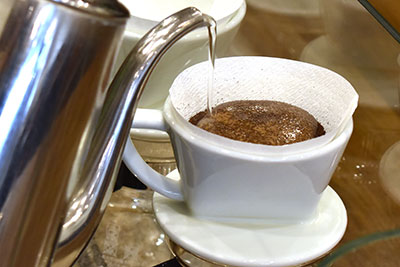 |
[The opportunity to open a coffee store in Tokyo]
One day, he was asked by his brother to guide a couple who visited Hokkaido on a trip. He quickly found out that the couple's daughter ran a coffee shop in downtown Tokyo, Minami-Senju area. "I had many similarities with her, such as music, and it didn't take long for us to be attracted to each other", says Taguchi in a calm tone while his beloved wife Fumiko sits next to him with a gentle smile on her face. On their marriage, they decided to run a new coffee shop, Café Bach, in Minami-Senju where Fumiko originally had a shop. Taguchi, unfamiliar with the area, was initially wary of this skid row where many day laborers gathered. "When I started to interact with them, there were many people who were warm and generous, and I soon realized that my first impression was faulty". Taguchi continues. "My wife was someone who truly understood the significance and value of running a coffee shop in this area", "and soon I came to think that this shop would be useful to many people." Since then, Café Bach continued to cater for 52 years as a place for many locals to gather and relax.
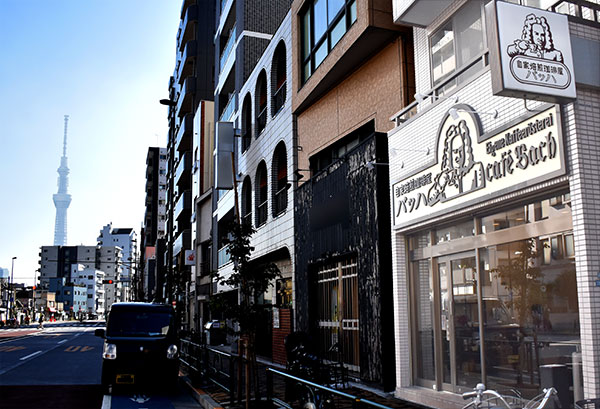 |
[Definition of "delicious coffee" by Café Bach]
Café Bach is a small distance from the center of Tokyo, but many customers are from all over Japan, and together with the regulars, line up from the opening to closing of the store. They all come to the place looking for the "best coffee" it offers. Delicious coffee defined by Café Bach consists of three conditions; made from fresh coffee beans, freshly roasted, and correctly roasted. However, the path to deriving this conclusion was not easy. "As we were pursuing delicious coffee, we encountered many challenges. I don't know how many times we ended up with a harsh after taste coffee that gave you heartburn, or not being able to reproduce the same taste. At that time, we had no references, such as books or the Internet, and we did not have standards, so we had a hard time not being able to ask anyone to teach us," Taguchi says. It was only after spending so much time and money that he found out that freshness of the coffee bean and inclusion of defective beans such as from insect damage, immature, and fermented were greatly influencing the taste. Then, once the defective beans were removed, the same brand and the same growing district beans could produce a totally different smooth and fragrant coffee. Since this astonishing discovery, "hand-pick" which removes the defective beans manually was carried out thoroughly - twice before and after roasting. Arrange coffee beans on a tray and remove defective beans one by one, takes a lot of labor and time. However, continuing it for over 40 years has resulted in stabilizing the flavor of the coffee, and establishing the standard of Café Bach.
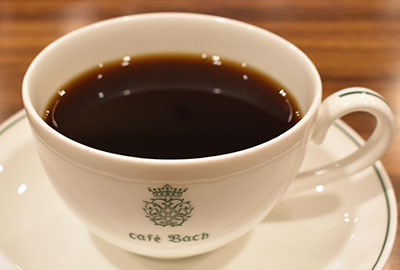 |
[Roasting that determines the taste of the store]
"Roasting" determines the flavor and aroma of coffee. Because the taste each coffee shop seeks is different, also it is one of the easiest things shops can do to differentiate themselves from each other, roasting is their most important task. Since roasting is an intricate art and each coffee bean is unique, they must look for the roasting method that fully brings out their characteristics. Mr. Taguchi, the "Roasting Legend," spent countless times trying different methods until he reached both optimum and repeatable roasting. "As we repeatedly test to establish the Café Bach's taste, we ended up developing a roaster for ourselves", Taguchi says. It dramatically increased the reproducibility of taste. On the other hand, the timing to stop roasting, which is said to be the hardest roasting techniques, must be determined by the human eyes, because the timing varies depending on the condition of the coffee beans. Long years of experience and observability are indispensable for quick identification of constantly changing beans. Taguchi believes the foundation of this experience is the hand picking, observing, and touching the raw beans to sorts. However, the handpicking requires the most manpower among all coffee bean processing steps and is often burdened by employees because the workload increases as the sales volume increases. Despite his own belief, Taguchi, who was minded to reduce labor costs for a long time, decided to introduce an optical sorter from Satake.
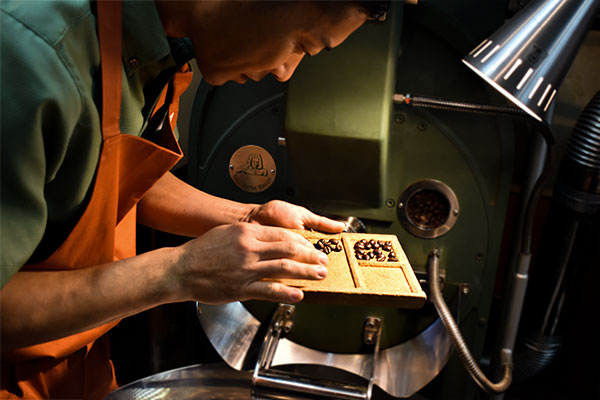 |
[Coexistence of manual labor and mechanization]
"Honestly speaking, in purchasing an optical sorter, we did not think of anyone but Satake" says Taguchi. In the 1990s, Café Bach temporarily checked Satake's demonstration machines, which were developing coffee-related equipment. After sorting raw beans in an optical sorter at Satake for the first time in about 20 years, he was surprised how technology got advanced, accuracy for sorting defective beans is high, the appearance is smart, and the operation noise is silent. In 2018, Satake introduced a compact optical sorter FMS2000-F equipped with a shape sorting function, which does not take space more than a roaster. Café Bach now sorts raw beans with it. "Although hand-picking will never be eliminated at Café Bach, Satake's optical sorter plays a key role in the sorting of beans. This mechanization made a great advantage for us" says Koichi Yamada, the General Manager. With recent work style reform, Café Bach experienced difficulties spending time on employees' technical training. "The introduction of the FMS2000-F dramatically reduced the time of hand-picking. Now we can spend those extra hours on the training", Yamada continues.
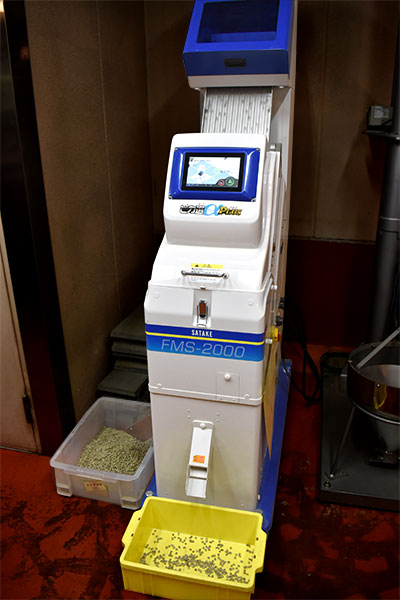 |
[The future of Japanese café]
Without a doubt, Café Bach has been leading Japanese café culture. We wonder if Taguchi has any wishes for the future Japanese café scene. "Nothing special. As it had been, coffee shops continue to provide customers with quality products and services. If I may add one, I would like to see that the café industry in Japan flourishes and advances even more" says Taguchi. He recently established a training center to convey their own knowledge and techniques to the next generations, and to create a place for cultivating people who will play a major role in the future coffee industry. "To teach, I need to reveal everything I know, and depending on how one perceives, it may look like I am creating business competitors. However, I firmly believe that it is a waste of time and money if the future generation has to experience everything I have from scratch - just to stand where I am now. If I can pass on all of my knowledge to them now, they can spend their time trying new things that no one has accomplished yet. That way, I'm confident that the Japanese café industry will evolve even further and the cafe market will expand," says Taguchi with a smile in his face. The world of coffee is deep and has no correct answer. All those involved with a passion will have different perceptions of the recent diversifying coffee trends. Taguchi strongly believes that it is good to have a wider choice for the industry in the end.
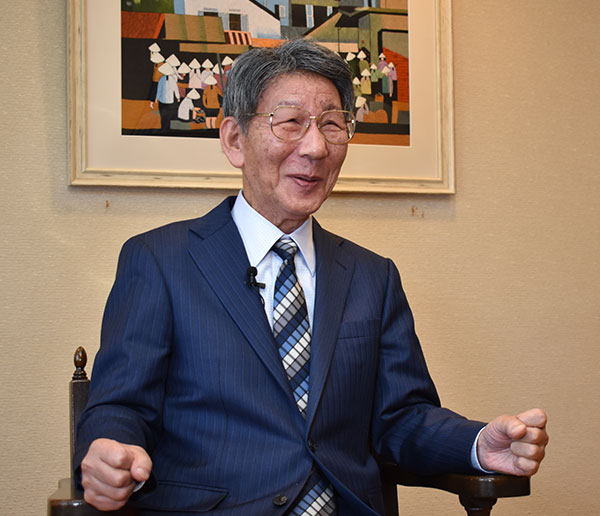 |
We ended Taguchi's interview with the final question; what is the best cup of coffee for you? "For me, it is the one brewed with freshly roasted coffee beans together with freshly baked bread as my wife bakes on the side. A cup of coffee with my wife at the start of the day is my favorite."
 |
-- -- -- -END- -- -- --
*Please note descriptions in this article are accurate as of the date of release and may differ from the most up-to-date information.
Appendix
【About Café Bach】
|
Company Name: |
Taguchi Coffee Co., Ltd. |
|
Owners: |
Mamoru and Fumiko Taguchi |
|
Store Locations: |
Café Bach 1-23-9 Nihonzutsumi, Taito Ward, Tokyo, Japan 111-0021 |
|
Website (Japanese): |
|
| -- -- -- -END- -- -- -- |
